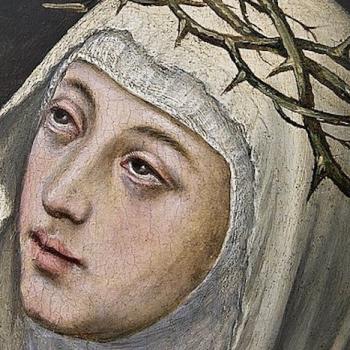
I offer today a thought or two about a theological controversy I’ve gotten myself involved in. They happen. This one involves the ordering of sacraments in the Episcopal Church.
Here’s the broad sketch. The Episcopal Church is gathering next month for its triennial General Convention. This has been called “Disney Land for Episcopalians,” which I’m afraid is misadvertised if you’re 7 years old and looking for princesses. On the other hand, if you’ve got lots of Episcopal friends around the country/world, or are deeply interested in minutia of church polity, it could just be your theme park! This year, sadly, as we navigate what—lips to God’s ears—all hope is the waning of the pandemic, the gathering will be a small affair in Baltimore. More or less invitation only. No princess photo-ops.
How Open Is the Table?
In the lead up to the gathering, a small group of folks wrote up a proposal to delete the canon, or governing rule, that states, “No unbaptized person shall be eligible to receive Holy Communion in this Church.” In response, a group of theologians from around TEC’s seminaries, led by my friend Rob in Tennessee, wrote a response. Our statement argued that we should not, in fact, remove that line. You can read more about the conversation, including our statement, here.
You can likely already imagine the controversy. We’re all—at least the many among that 22 that I know—friendly enough folk. Why would we want to keep insisting on a prohibition that limits invitations to the table? Would we have a dinner party and then decide, once we’re gathered, who gets to eat? Can’t communion become a way of inviting people to be baptized, rather than the other way around?
These are good questions, and I hope they can be part of a genuine conversation in the church in the weeks to come.
What Are the Sacraments Doing?
The key issue, for me, is the life of discipleship that all the sacraments call us into. Paul asks, “Do you not know that all of us who have been baptized into Christ Jesus were baptized into his death?” (Rom. 6:3). An offer of baptism that did not make this clear, either to the adult candidate or to the parents of a child candidate, would lack integrity. (“I’m sorry, what have I signed up for?!”)
Similarly with the Eucharist. “For as often as you eat this bread and drink the cup, you proclaim the Lord’s death until he comes” (1 Cor. 11:26). Paul says that we participate in the sacrificial death of Christ by becoming living sacrifices ourselves. I’ve written a bit about this here. Our self-involvement in and proclamation of Christ’s redeeming death is one we can offer once through water, and then can affirm habitually each time we consume bread and wine.
So churches need to be very clear about that, in the same way we are clear about the kind of commitment a marriage calls us to. These sacraments ask something of us.
Is There a Logical Order to the Sacraments?
There are lots of ways to show radical hospitality, to raise hight the roof beam, carpenters, and invite all into the life of the church. Meals, events, all the parts of worship prior to and following the actual reception of bread and wine. But the sacraments themselves are for those who are ready to offer their bodies as living sacrifices.
Roman Catholics link communion to, alternatively, baptism or confirmation. That is, a child baptized Catholic goes through preparation for first communion. An adult, who has been baptized in any Christian tradition, goes through preparation for confirmation, and then can commune. In both cases, the preparation is a way of clarifying what it is you’re signing up for.
Episcopalians used to link communion to confirmation as well, as my friend Dan (also a signatory on said letter) helped me understand. We no longer do, but instead link both to baptism. If you are baptized you are eligible for communion. And, with further study and guidance, you are eligible for confirmation as well. Both eucharist and confirmation, as we say, are rites that allow us to “remember our baptism.”
Should We Be Policing the Sacraments?
Hardly ever, I think, should this involve any actual gatekeeping. I wrote recently about marginal cases in which it is appropriate to uninvite someone to the table, to excommunicate. There are such occasions. I think pastors and presiders should go on saying “all are invited” as long as that is true. But a priest may find herself needing to go through the appropriate process to make a difficult decision. For instance, she may need to let an unreformed child abuser know that they will not be permitted to commune until they have made some significant amends. In that case, it’s time to be honest and change the invitation. All are no longer, at least for a time, invited.
Outside of those extreme cases, though, the sacraments offered on the table should have little or no policing. A robust eucharistic theology can handle a bit of porous application. A line written in a bulletin or spoken aloud that gives clarity to the order of sacraments—“we invite all baptized persons to the table,” say—is plenty. From there, folks can make their own decisions.
And in the end, of course, the table is open to all, because baptism is open to all, and because Christ’s saving death and life-bestowing resurrection is open to all. Clarifying the shape of that all-inclusive gift in our theology and liturgy is, I think, the more hospitable route.










